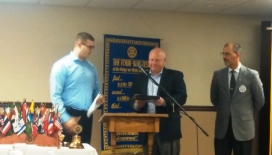Spokane Symphony - Eckart Preu
Posted
on Jan 26, 2015
Spokane North Notes
A weekly bulletin of the Spokane-North Rotary Club
January 26, 2015
Editors: Chuck Rehberg and Sandy Fink
Photo: Eric Johnson
Program Coordinator: Jim Minkler
Save the date: The club is planning its big annual fund-raising event Thursday, June 4, at The Backyard, 1811 W. Broadway. Early planning envisions a casual Hawaiian theme. In line with the club’s theme of helping needy kids at Holmes Elementary, the venue was picked because of its West Central location and vendor preference will be given to businesses located in that area. Coordinator Jodi Harland stresses that everyone in the club needs to be involved to ensure success. Last year’s social raised about $12,000.
Think globally: Area Rotary clubs are thinking about collaborative efforts on a global project, says club International Service Director Jim Minkler. Ideas from members are welcome. Patrick Jones of Club 21 is coordinating the effort.
Deadline near: Reduced-price tickets to hear noted Rotary International speaker Rick King are available through Jan. 31, said coordinator Melody Farance. The $40 tickets increase to $50 Feb. 1 for King’s Feb. 26 talk at the Inn at the Park. Contact Melody or Suzy (534-8998), the Club 21 secretary.
Feb. 26 talk at the Inn at the Park. Contact Melody or Suzy (534-8998), the Club 21 secretary.
 Feb. 26 talk at the Inn at the Park. Contact Melody or Suzy (534-8998), the Club 21 secretary.
Feb. 26 talk at the Inn at the Park. Contact Melody or Suzy (534-8998), the Club 21 secretary. Welcome: New member Chad Cherry was formally inducted into the club as a new member. Sponsored by past president (and golfing buddy) Bruce Ellwein, Cherry is a loan team manager at Wells Fargo Bank.
Symphony leader hits all the right notes
It was an encore performance for Eckart Preu (rhymes with “joy”), and the engaging Spokane Symphony music director once again charmed his audience at the Jan. 26 club luncheon.
 Preu, the seventh music director in the Symphony’s 70-year history, has led the 70-piece orchestra since 2006.
Preu, the seventh music director in the Symphony’s 70-year history, has led the 70-piece orchestra since 2006. Recalling that he visited Spokane-North when the club met weekly at Inn at the Park, Preu said, “I’ve come to appreciate more and more what you (Rotarians) do. The philosophy of how I serve my community, and this whole concept of volunteering, is quite different than in (his native) Germany.”
Preu laments that “in the U.S. everyone is aware of what role the arts play, but it’s an area where some people don’t like to spend money.” He cited the example of one Julliard-trained musician who accepted a Symphony position, taking “a single-digit salary.”
Preu, by age 10 a soloist in the famous Dresden Boys Choir, has been music director in Spokane since the 2004-05 season, succeeding Fabio Mechetti (1993-2003). Preu came to the U.S. after winning a German national conducting competition in 1996. He conducted at Carnegie Hall in 1999 and at the Sorbonne in Paris.
Preu said he spends about 10 weeks a year leading the Stamford, Conn., Symphony, a post he began in the 2005-06 season. “That’s not a community orchestra,” he said. “We just get some musicians from New York and go up there.”
Preu also has been a guest conductor in Israel, Chile, New Zealand, Hungary, Bulgaria, France and Germany, plus with orchestras throughout America.
Attending the luncheon with Preu was Audrey Overstreet, Symphony director of marketing and public relations.
Through imaginative outreach programs, he said, the Symphony tries to expand it audience beyond “the rich, the educated and the elderly.” The Symphony holds short concerts, workshops and master classes for some 30,000 students throughout the region, he said, adding “There’s not much (orchestral music) you can teach in 20 minutes, but you can get a vision. It gives students a goal.”
Another Symphony outreach program, “Orchestrating Greatness,” is a collaboration with the YMCA targeting at-risk kids. Preu said apparel at the student classes often ranges “from nice suits to kids with hoodies.” One student in the latter category, he said, initially looked disinterested – among those whose attitude is “how lame can this be?” – but by the end of class “he was conducting and had a blast.”
In addition to teaching music, Preu said, the programs also teach discipline, “because I’m German.”
Preu recalled his East German upbringing and fights with his father, who insisted that Eckart “sit down at the piano every day.” He added: “Now I have those fights with my daughter, who plays the violin. And it’s (the playing) horrible at the beginning.”
Another Symphony outreach, Preu proudly recalls, is the orchestra’s appearance on Spokane tribal lands at Wellpinit. “We were the first orchestra on an Indian reservation,” he said, adding that tribal children sang along in Salish.
With all the innovative performances, it’s no surprise that the Spokane Symphony won a 1st place ASCAP award in 2014 for adventurous programming.
Of the popular annual outdoor concerts in Liberty Lake and Spokane’s Comstock Park, Preu said the crowds number in the thousands, “but for 60 percent it’s the only one (Symphony performance they will see).”
The music director also shared the stark economics of classical music.
“Whenever we put on a concert, we lose money,” Preu said. The recent program on Mahler (Debussy’s “Prelude to the Afternoon of a Faun” and Mahler’s 5th Symphony) had 80 people on stage for 75 minutes. It cost $80,000 to $100,000 to produce, and there is no way you can make that up with ticket sales.”
Bruce Ellwein asked Preu if he was still in East Germany when the Berlin Wall came down. Preu responded that he was “born in 1969 and had a great childhood,” though by his early teens most lessons “were infused with ideology.” Military service was mandatory, he said, and he was in the Army when the wall came down. “I was very afraid that I would have to shoot my own people in the streets,” Preu said.
Preu marvels at the high level of artists and artistic performances –writers, actors and musicians – in the Spokane area. He adds: “Every great city has an orchestra.”
